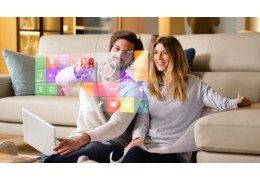What will our smart homes of the future look like?
With recent technology advancements and the beginnings of the automation era, smart homes are making permanent and unprecedented changes to the way we live. Forgetting things like setting security alarms or turning on the dishwasher could become relics of a former way of life as automation systems manage and link our appliances, thermostats, and even computers while putting all their features into the palms of our hands. Imagine being able to control your home with a simple remote while you're at home and with your tablet PC while on the go!
While the idea of a smart home is not new, they are on the verge of rising fast in popularity as automation technology becomes more affordable and available. The emergence of artificial intelligence technologies can have further implications for the future of smart homes. Computers could learn your dietary habits and automatically make you and your favourite kind of food or automatically place shopping orders and have the food you need to be delivered to your door. Technology implemented in your home learning what types of temperatures you prefer may mean that controllers can automatically set your thermostat to the temperature that will maximize comfort. Devices will become available that are able to move necessary items to clean dirty surfaces. The introduction of artificial intelligence technologies will make the potential for smart homes unbounded.
The past and future of Home automation technology has been around since the first half of the 1900s. However, the past decade has finally begun to see a surge of interest in technology. The current trends of more advanced technology becoming available for lower prices smart home automation features could become standard far sooner than many of us imagine.
At the end of 2018 there were more than 200 million homes globally with at least one smart home device, it is predicted that by 2023 there will be an additional 100 million smart homes as the market reaches 30% of all broadband households globally. By the end of 2023 there will be more than 6.4 billion smart home devices in use, and the prediction rockets from there into the future years where the majority of all homes will be entirely smart.
Smart home experts have considered innovations of the future and what we might find in our Smart Home, with ideas such as 3d printing of edible food to a drone delivery services that your home automatically orders and pays for the possibilities are endless.
So, with the advances in technology, what do you think our homes of the future to look like?

